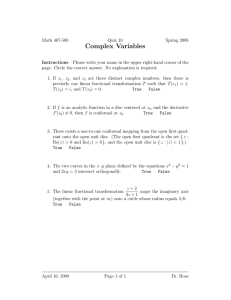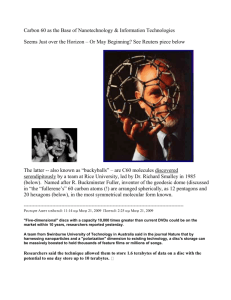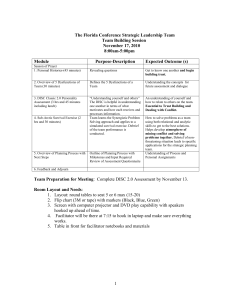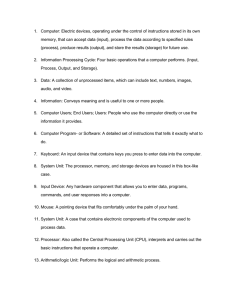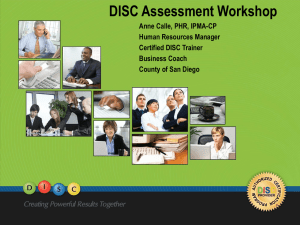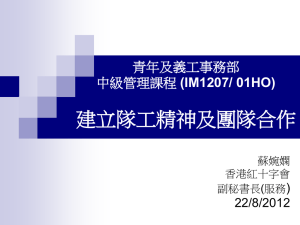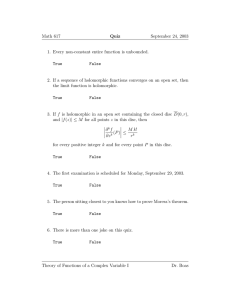Anchor-Discourse Pairings Summer 2016 ANCHOR II Course Title
advertisement
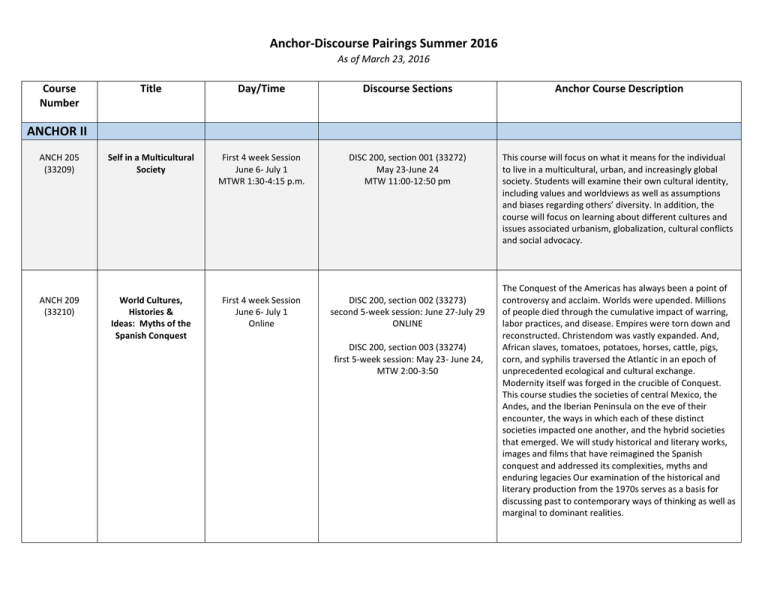
Anchor-Discourse Pairings Summer 2016 As of March 23, 2016 Course Number Title Day/Time Discourse Sections Anchor Course Description ANCH 205 (33209) Self in a Multicultural Society First 4 week Session June 6- July 1 MTWR 1:30-4:15 p.m. DISC 200, section 001 (33272) May 23-June 24 MTW 11:00-12:50 pm This course will focus on what it means for the individual to live in a multicultural, urban, and increasingly global society. Students will examine their own cultural identity, including values and worldviews as well as assumptions and biases regarding others’ diversity. In addition, the course will focus on learning about different cultures and issues associated urbanism, globalization, cultural conflicts and social advocacy. ANCH 209 (33210) World Cultures, Histories & Ideas: Myths of the Spanish Conquest First 4 week Session June 6- July 1 Online DISC 200, section 002 (33273) second 5-week session: June 27-July 29 ONLINE ANCHOR II DISC 200, section 003 (33274) first 5-week session: May 23- June 24, MTW 2:00-3:50 The Conquest of the Americas has always been a point of controversy and acclaim. Worlds were upended. Millions of people died through the cumulative impact of warring, labor practices, and disease. Empires were torn down and reconstructed. Christendom was vastly expanded. And, African slaves, tomatoes, potatoes, horses, cattle, pigs, corn, and syphilis traversed the Atlantic in an epoch of unprecedented ecological and cultural exchange. Modernity itself was forged in the crucible of Conquest. This course studies the societies of central Mexico, the Andes, and the Iberian Peninsula on the eve of their encounter, the ways in which each of these distinct societies impacted one another, and the hybrid societies that emerged. We will study historical and literary works, images and films that have reimagined the Spanish conquest and addressed its complexities, myths and enduring legacies Our examination of the historical and literary production from the 1970s serves as a basis for discussing past to contemporary ways of thinking as well as marginal to dominant realities. ANCHOR III ANCH 303 (33211) Film Adaptation Class meets May 16, 17, 18 and May 23, 24, 25 from 10:00 a.m.- 4:30 p.m. DISC 300, section 001 (33275) first 5-week session: May 23- June 24 OC Class meets on campus May 26 from 9-12 and June 23 from 9-4 Class meets at the Tivoli Manor Square Theater DISC 300, section 002 (33276) first 5-week session: May 23-June 24 OC Class meets on campus May 26 from 1-4 and June 24 from 9-4 The class will explore the process of adapting both fiction and non-fiction literary works into motion pictures. Students will examine the original literary source, then the interim screenplay and finally the completed motion picture. This class will also explore the practical aspects of creating a film adaptation in Kansas City. Students will interact with Kansas City area film professionals and learn about the practical aspects of filming and exhibiting films in Kansas City. DISC 300, section 0009 (33367) First 5-week session: May 23-June 24 Class meets June 11-12, 25-26 and July 910 from 9:00a.m.- 4:00 p.m. ANCH 307 (33208) Frauds, Myths and Mysteries in Archaeology June 6- July 29 Online OA DISC 300, section 003 (33277) June 6-July 29 ONLINE DISC 300, section 004 (33278) June 6-July 29 ONLINE DISC 300, section 005 (33279) June 6-July 29 ONLINE DISC 300, section 006 (33280) June 6-July 29 ONLINE DISC 300, section 008 (33366) June 6-July 29 ONLINE DISC 300, section 007 (33281) second 5-week session: June 27-July 29, MTWRF 11:00 a.m.-12:30 p.m. Using interesting archaeological hoaxes, myths, and mysteries from around the world, including within the state of Missouri and in the Kansas City region, students will use science to learn how to make good judgments about the information they receive on various media in today’s world. By exploring a variety of wildly inaccurate claims about the past – in news reports, books, film and other media - within the context of the scientific method, this course will demonstrate how science approaches questions about human antiquity and, in doing so, will show where pseudoscience falls short. By studying both global and local examples, students will be able to have a stronger connection with their own community, and a better understanding of how urbanization has a significant impact on important local cultural resources. (Lecture/online asynchronous)
